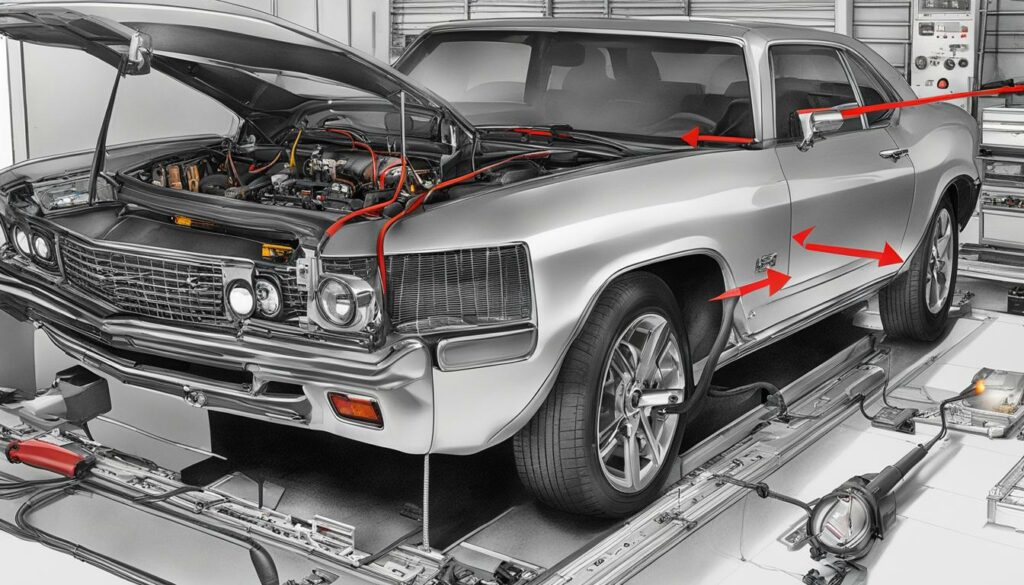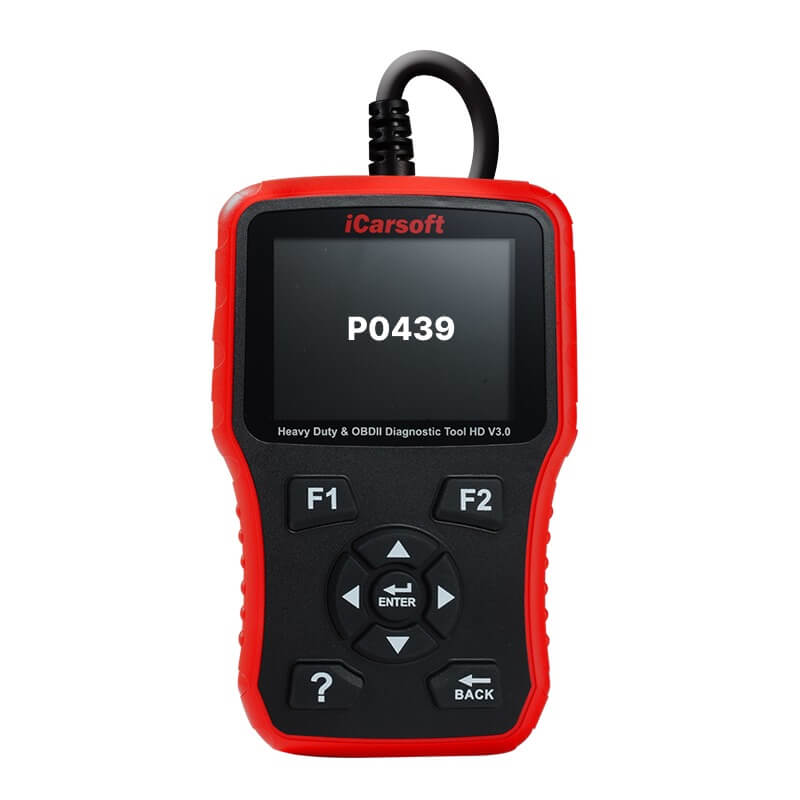P0439 – Catalyst Heater Control Circuit Low Bank 2
POSTED IN pcodes
Welcome to our article on the P0439 code, specifically focusing on the catalyst heater control circuit low bank 2. If you’re experiencing issues with your vehicle and have come across this code, it’s essential to understand its meaning and potential implications. Receiving the P0439 code indicates that the catalyst heater control circuit has sent a voltage reading below the acceptable range to the PCM (Powertrain Control Module).
This malfunction can lead to inefficient engine operation and trigger the check engine light. It’s crucial to address this code promptly to prevent further damage to your vehicle and ensure optimal performance. We will explore the common causes, diagnostic process, potential mistakes, and repair options for the P0439 code in the sections below.
Key Takeaways:
- P0439 is a check engine light code that points to a catalyst heater control circuit low voltage reading on bank 2.
- Faulty catalytic converters and oxygen sensors are common causes of the P0439 code.
- The code can also result from issues with various sensors, fuel injection components, or the catalyst temperature sensor.
- Diagnostic steps include using an OBD-II scanner, visual inspections, and replacing damaged wires and connectors.
- Persistent issues may require checking the oxygen sensors and catalytic converter. Clearing the code after each repair attempt is recommended.
- Under-diagnosing the catalytic converter failure and replacing oxygen sensors without addressing the underlying issue are common diagnostic mistakes.
- Repair options for the P0439 code include replacing damaged components, such as wires, connectors, oxygen sensors, or the catalytic converter.
Symptoms and Diagnostic Process for P0439 Code
When encountering the P0439 code, there are several symptoms and a diagnostic process to follow. The most common sign is an illuminated check engine light, indicating an issue with the catalyst heater control circuit. Additionally, potential engine stalling may occur, signaling a malfunction in bank 2’s catalyst heater.
However, the presence of other drivability issues such as hissing noises, stalling, hesitation, or lack of performance could suggest a broken or melted component within the converter. Proper diagnosis is crucial to pinpoint the underlying cause of the code.
To diagnose the problem, a mechanic should take the following steps:
Buy tested tuning file for Adblue / EGR / DPF / Adblue off now!
- Use an OBD-II scanner to verify the P0439 code and check for any accompanying codes that could provide further insight.
- Perform a visual inspection of all electrical components, paying close attention to wires and connectors. If any damage or corrosion is detected, they should be promptly replaced.
- If the issue persists, check the oxygen sensors and the catalytic converter itself. The oxygen sensors play a vital role in determining the efficiency of the catalytic converter. Any faulty sensors should be replaced, and if necessary, the catalytic converter may require attention or replacement.
- After each repair attempt, it is essential to clear the code and retest the system to ensure the problem has been successfully addressed.
By following this diagnostic process, mechanics can accurately identify the cause of the P0439 code and take the necessary steps to resolve it.

Common Causes and Diagnostic Steps for P0439 Code
| Common Causes | Diagnostic Steps |
|---|---|
| Faulty catalytic converters | Inspect the catalytic converters for any damage or malfunctions. Replace if necessary. |
| Faulty oxygen sensors | Check and replace any faulty oxygen sensors that could be impacting the efficiency of the catalytic converter. |
| Issues with various sensors (coolant temperature sensor, mass air flow sensor, manifold air pressure sensor) | Inspect and test the various sensors for proper functioning. Replace any faulty sensors. |
| Fuel injection components | Examine the fuel injection components for any issues or malfunctions. Repair or replace as needed. |
| Contaminated oil | Ensure that the oil is free of contaminants that could affect the catalytic converter. Change the oil if necessary. |
| Problems with the catalyst temperature sensor or its electrical connections | Inspect the catalyst temperature sensor and its electrical connections for any issues. Repair or replace as needed. |
Common Mistakes and Severity of P0439 Code
When diagnosing the P0439 code, it is crucial to avoid common diagnostic mistakes that can hinder accurate identification of the issue. One such mistake is under-diagnosing the catalytic converter failure. If the root cause of the converter failure is not addressed, a new converter may also fail, leading to ongoing problems and costly repairs in the future.
Another common mistake mechanics make when dealing with the P0439 code is replacing oxygen sensors without addressing the potentially more expensive catalytic converter replacement. While faulty oxygen sensors may contribute to the issue, they are often secondary to the primary problem with the catalytic converter. Focusing solely on sensor replacement can delay the necessary repair and result in further damage to the vehicle.
The severity of the P0439 code lies in its direct impact on engine efficiency. The catalyst heater control circuit low voltage reading in bank 2 can lead to inefficient engine operation and reduced fuel economy. Moreover, if left unresolved, this code can potentially cause more extensive damage to other engine components, such as the spark plugs or engine valves.
Remember, properly diagnosing and addressing the underlying cause of the P0439 code is crucial to prevent further complications and costly repairs.
Repairs for the P0439 Code
To address the P0439 code, a technician may attempt several repairs. These can include:
- Replacing damaged wires and connectors
- Replacing oxygen sensors
- Replacing the catalytic converter
Each repair should be followed by clearing the code and performing a retest to ensure the problem has been fully resolved.
If professional assistance is unavailable, there is an alternative option for the permanent removal of the P0439 code. This can be done by uploading the Engine Control Unit (ECU) file to a designated portal.

Conclusion
In conclusion, the P0439 code indicates a malfunctioning catalyst heater control circuit in bank 2, which can result in inefficient engine operation. Common culprits for this code include faulty catalytic converters or oxygen sensors, as well as issues with various sensors or fuel system components. It is crucial not to ignore this code, as doing so can lead to further damage to your vehicle.
For accurate diagnosis and repair, it is recommended to seek professional assistance. A qualified mechanic can perform a thorough inspection and identify the underlying cause of the code. Proper repairs, such as replacing damaged components or sensors, should be carried out to ensure optimal engine performance.
However, if professional assistance is unavailable or you prefer an alternative solution, there is an option for permanent code removal. By uploading the Engine Control Unit (ECU) file to a designated portal, you can permanently remove the P0439 code. This alternative solution can provide peace of mind and prevent the need for further repairs.
Addressing the P0439 code promptly is essential to avoid more extensive and costly repairs in the future. Whether you choose to consult a professional or explore the alternative option, taking action to resolve the issue will contribute to the longevity and efficiency of your vehicle.
FAQ
What does the P0439 code mean?
The P0439 code indicates that the catalyst heater control circuit has sent a voltage reading below the acceptable range to the PCM (Powertrain Control Module).
What are the symptoms of the P0439 code?
The most common symptoms of the P0439 code are an illuminated check engine light and potential engine stalling. Other drivability issues may include hissing noises, stalling, hesitation, or lack of performance.
What are the common causes of the P0439 code?
Common causes of the P0439 code include faulty catalytic converters or oxygen sensors. Other potential causes may include using the wrong fuel type, issues with various sensors, fuel injection components, contaminated oil, or problems with the catalyst temperature sensor or its electrical connections.
How is the P0439 code diagnosed?
To diagnose the P0439 code, a mechanic should use an OBD-II scanner to verify the code and perform a visual inspection of all electrical components. Damaged or corroded wires and connectors must be replaced. Oxygen sensors and the catalytic converter should also be checked.
What are common mistakes when diagnosing the P0439 code?
One common mistake is under-diagnosing the catalytic converter failure. If the underlying issue causing the converter failure is not addressed, a new converter can also fail. Additionally, some mechanics may replace oxygen sensors instead of addressing the potentially costlier catalytic converter replacement.
How severe is the P0439 code?
The severity of the P0439 code lies in its direct impact on engine efficiency. If left unresolved, it can lead to more extensive repairs in the future.
What are the repair options for the P0439 code?
Repair options for the P0439 code may include replacing damaged wires and connectors, oxygen sensors, or the catalytic converter. Clearing the code and performing a retest after each repair is recommended.


